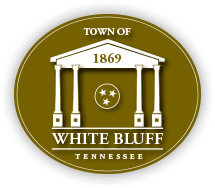White Bluff got its name from the white bluffs that run along nearby Turnbull Creek. In 1806, Fort White Bluffs was constructed and soon after White Bluff Iron Forge was started. From these humble beginnings, a dynamic community has grown.
Arguably, three of the most influential people in the history of White Bluff are Col. William James, Mrs. Jeannie Woodworth and Zollie H. Bibb, Jr.
After his education at Tracy Academy in nearby Charlotte, Col. James graduated from the U.S. Military Academy at West Point in 1872, and served in the Indian Wars, the Spanish-American War and the Phillippines. When he returned to White Bluff, he was already a wealthy man from many investments made while he was in military service. Add to this the large land holdings in White Bluff he inherited from his mother, and you have the makings of a powerful and influential presence in town.
Although Jeannie Woodworth came to White Bluff as an Episcopalian Missionary with her husband, E.S. Woodworth, by way of Chicago, IL in 1905; she was no stranger to the area, having spent time in Cumberland Furnace as a child. Perhaps her most long-lasting contributions to White Bluff came in the form of literacy reform. Mrs. Woodworth considered the widespread illiteracy to be appalling and set out to open a library and learning center. With donations from the community, she opened Elizabeth House in 1914, named in honor of Col. James’s mother. The facility provided books and taught classes to adults and children until the mid-1950’s. Mrs. Woodworth, along with Marshall Jarrett Howell and others, was also responsible for getting White Bluff reincorporated in 1907.
The rest of the twentieth century saw many changes to White Bluff. A fire in 1946, which destroyed much of the town, helped underline the need for a permanent water supply for the town. The push for this brought to the spotlight another man who would become a very well-known and influential person, Zollie H. Bibb, Jr. His efforts, along with Basil Thompson and others, culminated in the formation of the White Bluff Utility District in 1965. Beyond this accomplishment, Mr. Bibb was instrumental in founding White Bluff’s first volunteer fire department. Bibb served as fire chief for many years and bought the towns first fire engine with his own money. Bibb, along with fellow resident and businessman Calvin Larkins, also worked to bring business to White Bluff in the latter part of the twentieth century. They constructed a large industrial site and through their efforts brought Nashville Wire Products to the area. An industrial board was formed and recruitment of industry was started that even today provides jobs for the local community.
Through the efforts of the people discussed, as well as many others too numerous to mention in this short narrative, the town of White Bluff has prospered. The 2010 U.S. census places White Bluff’s population at 3,206, making it the second largest town in Dickson County. Our percentage population growth of 49.7% from 2000 until 2010 makes White Bluff the 12th fastest growing community in Middle Tennesee and the 25th fastest growing community in the state.
